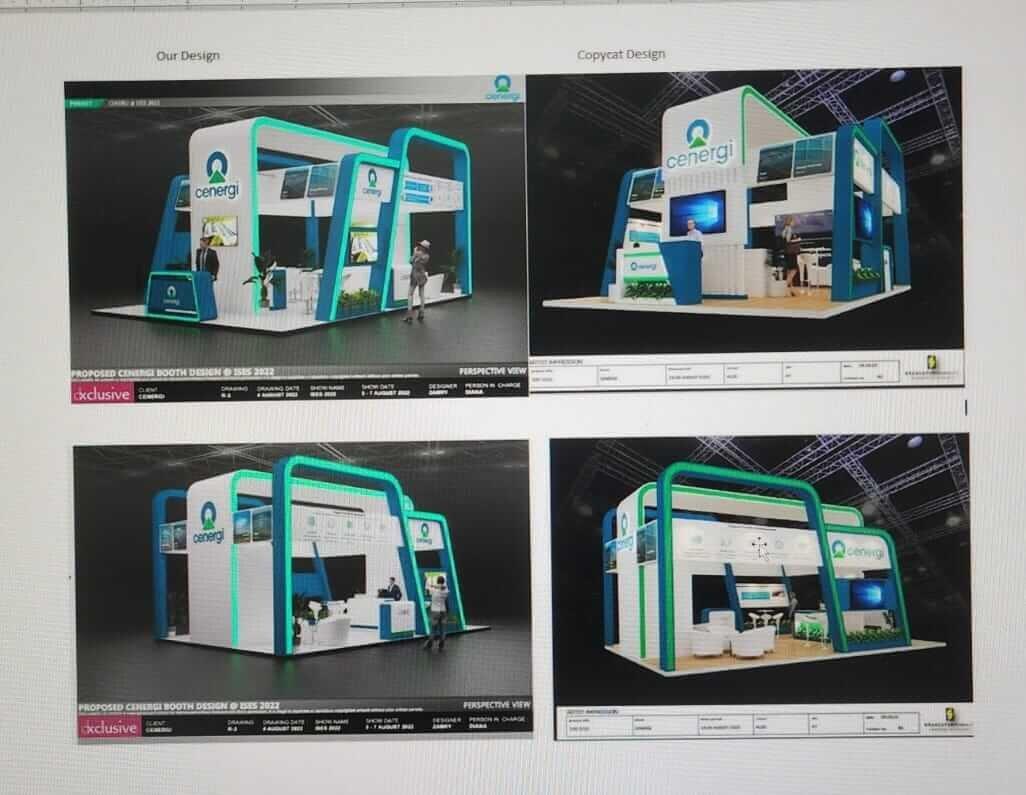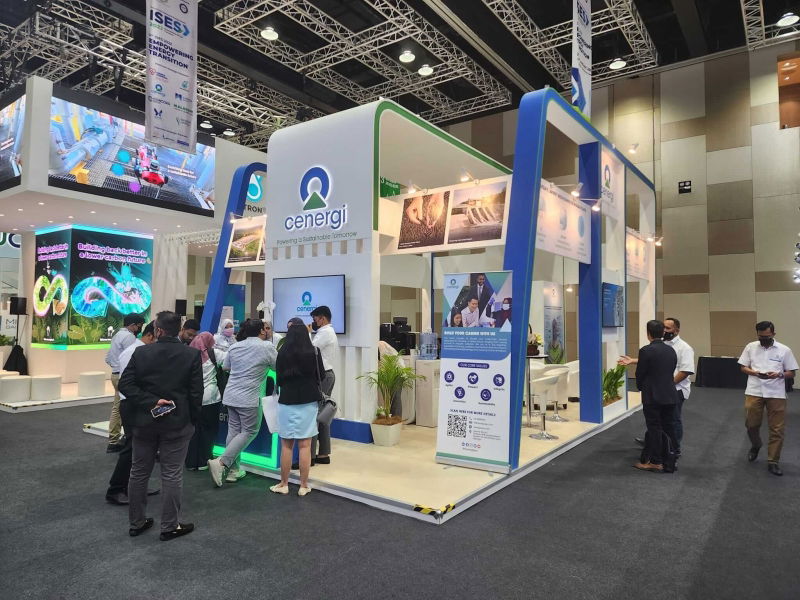
Design firm Dxclusive CEO on agencies feeling hopeless on copyright issues in MY
share on
Khazanah-backed sustainable energy solutions company, Cenergi SEA, drew chatter for allegedly stealing an idea from design company Dxclusive. The company has since stated that it is investigating the issue, and that further updates will be provided as soon as possible. Meanwhile, shortly after A+M published the news yesterday, founder and CEO of Dxclusive Diana Chew, said on Facebook that both parties have reached an amicable solution and removed her initial post.
In a conversation with A+M, Chew added that many Malaysian are not aware of the design copyright, that is why this issue keeps popping up.
“We realised this only happens with big companies because of the procurement process, where the goal is to get the finest idea with the cheapest price. Many might not be aware that what they are doing isn’t actually ethical because there isn’t enough awareness on the topic,” she said, adding:
Many designers and agencies encounter this situation, the community often feels hopeless in speaking out due to the lack of support.
“Corporates should educate or provide guidelines to their marketing department for the tender process. If you are to call for a tender and like the agency's idea, just seek the agency's expertise. Instead of taking that idea and going back to your preferred contractors just because you want a cheaper price. If that's the case, a tender should not be called,” she added.
On a personal level, Chew added that when clients approach her to quote for a design done by another company, she generally refrains from offering them one because it is unethical.
Chew previously said on Facebook the team had pitched for a Cenergi tender at the end of July and worked overtime to turnaround a proposal within two days. She added that it was "a very rushed project", but the client liked the concept and brought in its procurement team. However, "due to the tremendous price squeeze", Chew said the team was unable to take on the job. Yet, they realised a week later that Cenergi had used its design and gotten another vendor to do the work. She then contacted the client to explain that the design rights clearly belong to Dxclusive, as stated in the proposal and quotation.
Cenergi did not comment on A+M's queries on how the matter was resolved at the time of writing. Prior to deleting the post, Chew also shared images of the similarities.


Copyright as well the ownership of IP rights seem to be a recurring issue in the marketing and advertising scene. 4As Malaysia also spoke out about it previously, pointing out the "alarming number" of clients that have been demanding ownership of IP during the RFP stage. It also called such a practice "unethical and unfair".
A poll conducted by A+M in our Telegram group chat previously, which had more than 100 respondents from Southeast Asia, also found that 48% said it is a norm to have client steal their ideas. Meanwhile, 41% said this has happened to them on some occasions and 11% indicated that they have never had such an experience.
The latest incident with Cenergi shows that more can and should be done to educate clients on the importance of copyright and IP rights. Khairudin Rahim, who is also the CEO of 4As Malaysia, told A+M in his personal capacity that it is a core business principle and a global norm of business dealings with the creative industry that all ideas, concepts, trademarks and materials that a design company submits to a prospective client are presented for the sole purpose of allowing them to determine whether they wish to use the presentation ideas, plans and work and to engage the design company.
The intellectual property remains the design company’s property unless an agreement is reached on the appropriate compensation.
Khairudin added that it is also a norm that the design company's IP may not be used in any manner the client wishes. "If the public allegations made against Cenergi SEA by Dxclusive for behaving unethically by 'stealing other people’s work' is indeed true, then it is only right that Cenergi’s top management apologise and expediently reach an agreement on fair compensation," he said.
Secondly, Khairudin said Cenergi's personnel who allegedly was party to this action should face internal disciplinary action for this unethical conduct. "This will help eliminate any wrong perceptions of the GLC’s goodwill and reputation not only at its home base but for Malaysian GLCs internationally," he added.
Malaysia's Copyright Act 1987 states that where a work is commissioned by a person who is not the author's employer under a contract of service or apprenticeship, the copyright shall be deemed to be transferred to the person who commissioned the work or the author's employer, subject to any agreement between the parties excluding or limiting such transfer.
In this case, Khairudin explained that the copyright of the non-commissioned work developed by Dxclusive belongs entirely to the design company because there was no prior contract or service agreement between them and the GLC that excluded or limited the IP transfer. "The law does protect the design company and the creative industry for all ideas and work shown in a speculative pitch," he explained.
Meanwhile, Chew's willingness to speak out against such a practice can be thought of as admirable and courageous. Shaun Tay, co-owner and CEO of FCB SHOUT, said the unfortunate reality is that incidents such as these remain prevalent. "I admire Chew's willingness to stand up, push back and fight for what is right. Inspiring stuff! The size of an agency should not be a determining factor in the strength of belief," he said.
Eradicating idea theft in totality is difficult, but we can help ourselves by being hard-nosed about client selection and contractual agreements. Reputation counts both ways. If a pitch feels dodgy, drop it!
FCB SHOUT currently works with clients including RHB Bank and Darlie, and Tay said he has been fortunate to work with "many stellar clients that are incredibly respective and appreciate of an agency’s time and effort put into pitches".
"Even if they aren’t able to execute the proposed ideas they have offered to remunerate for time spent and in some instances, paid the total concept fee due to us whilst engaging a more cost-effective production option to materialise the work. It’s a win-win approach," he explained.
In a similar fashion, cryptocurrency firm Coinbase was also criticised for downplaying agency contribution to its Super Bowl ad earlier this year. Its ad featuring merely a QR code that bounced around the screen just like a DVD logo drew chatter among netizens and resulted in CEO Brian Armstrong tweeting "No ad agency would have done this ad".
However, CEO of The Martin Agency, Kristen Cavallo responded saying that the ad was inspired by the agency's presentations carried out in August and October last year. She claimed then that the pitches showcased ad concepts for the Super Bowl with floating QR codes on a blank screen.
(Read also: Coinbase CEO superbowl ad saga: Industry pros and our readers say its norm in Asia)
How can agencies protect themselves?
4As Malaysia stated in its best practice guide titled "Ownership of agency ideas and work developed during a pitch" that agencies retain the rights to the materials submitted during a pitch unless an agreement is reached on the appropriate compensation in advance. It also highlighted the fine prints in RFP which might include:
1. All materials submitted in response to this RFP become the sole property of (advertiser)
2. All submissions for the RFP are not returnable and shall become the property of the client.
"The industry will be held to ransom if there is no mutual respect for intellectual property rights," 4As said. It added that advertisers who practice and support the payment of pitch fees to shortlisted agencies need to be informed that this payment is "merely to partially offset some of the agency costs incurred". The fees do not confer the right of the advertiser to utilise the agency's IP directly or indirectly. It also does not alter the agency's ownership of agency-developed presentation concepts and materials, 4As said.
However, in the event an agency does sign off such rights to a potential client, there is no longer such protection under the law, even when the agency is unsuccessful in a pitch. This would also mean that the agency cannot use an edited version, similar ideas, and plans for all future pitches, as it has been assigned. The 4As has been firm in its position that no agency shall participate in a pitch or RFP where the advertisers require that all or part of the pitch proposal becomes the advertiser's property at the pitching stage or if the pitch proposal is unsuccessful.
It also suggested some illustrative ownership retention language that agencies can consider included in all pitch materials and documents as well as new business documents. For example, "The copyright of this work is vested in Ad Agency Sdn Bhd. This document is issued in confidence for the purpose only for which it is supplied. It may be reproduced in whole or part, solely for the purposes of evaluation and then only on the condition that this notice is included in any such reproduction.
No information as to the contents or subject matter of this document or any part thereof arising directly or indirectly there from, may be implemented, utilised or be given orally or in writing or communicated in any manner whatsoever to any Third Party, being an individual firm or company or any employee thereof, without the prior consent in writing of Ad Agency Sdn Bhd. © Ad Agency Sdn Bhd (date)."
Related articles:
MY design company founder accuses Khazanah-backed Cenergi of idea theft
Idea theft: Is the client or the creative to be blamed?
Why it's bloody hard to prevent idea theft
In the spirit of growing revenues, is idea theft becoming a norm in Indonesia?
Coinbase CEO called out for downplaying agency contribution to Super Bowl ad
Photo courtesy: Diana Chew's Facebook page
share on
Free newsletter
Get the daily lowdown on Asia's top marketing stories.
We break down the big and messy topics of the day so you're updated on the most important developments in Asia's marketing development – for free.
subscribe now open in new window
